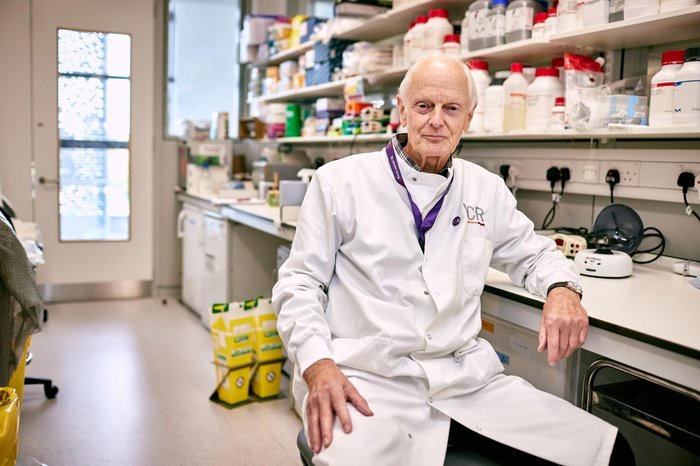Developing a new way to treat T-cell acute lymphoblastic leukaemia (T-ALL)
T-cell acute lymphoblastic leukaemia (T-ALL) is a fast-developing type of blood cancer that is often treated with chemotherapy, which can have harsh and debilitating side effects. Professor Rabbitts hopes to develop a new treatment with far fewer side effects that only targets the cancer cells, leaving healthy cells unharmed.

Professor Terry Rabbits in the lab
The challenge
T-cell acute lymphoblastic leukaemia (T-ALL) is a fast-developing type of blood cancer that affects white blood cells called T-cells. T-cells are a type of white blood cell that are part of our body’s defence system that are responsible for fighting infections and disease. Cancerous T-cells have features that make them aggressive and grow out of control. T-ALL is usually treated with chemotherapy, however, this form of treatment destroys both healthy cells and cancerous cells. It is therefore important to find new ways to better treat the disease.
The project
Professor Rabbitts and his team want to develop a new treatment for people with T-ALL. Antibodies are molecules that circulate in our blood locating and killing bacteria and viruses that cause infections. Most cancer-causing molecules are hidden inside cancer cells. The antibodies in our blood aren’t able to find and destroy these cancer-causing molecules as they are busy trying to combat infections, like flu. Professor Rabbitts wants to try a new technique and put these antibodies inside cells. By placing the antibodies directly inside our cells he believes they will be able to find and destroy the cancer-causing molecules. He hopes this treatment will be successful, as unlike traditional treatments like chemotherapy which target all cells, this technique will only target the cancer cells and leave all healthy cells unharmed.
The future
If successful, he hopes the research will lead to the development of new, more effective treatments for people with T-ALL that will only destroy cancer cells and have far fewer side effects than current chemotherapy treatments. This will help to give people affected by T-ALL a better quality of life and the best possible chance of survival.
